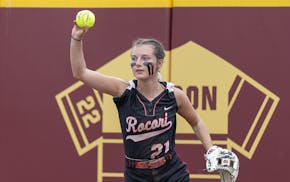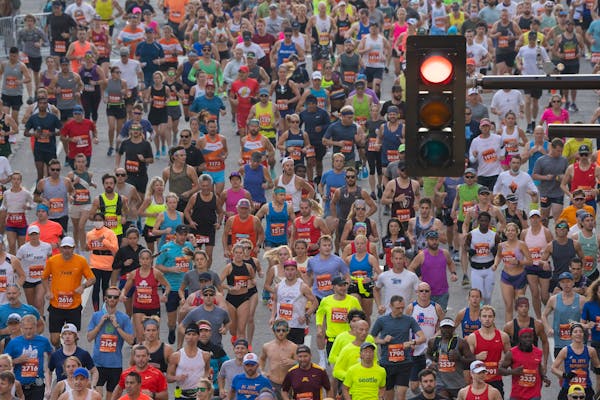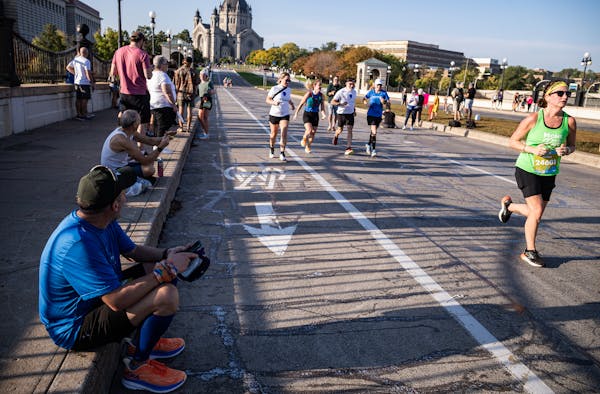Twin Cities Marathon officials canceled the race early Sunday from Minneapolis to St. Paul when the threat of heat — with a record high in the 90s, humidity and cloudless skies — was deemed too dangerous for participants.
As many as 8,000 runners were set to compete in the 42nd running of the marathon, with 12,000 more in the TC 10 Mile, and thousands of spectators on the streets of both cities.
Sunday's weather forecast put the races into black-flag status ("extreme and dangerous conditions"), prompting the cancellation.
The marathon had never been canceled because of the weather, but the heat has been a factor in earlier races. At the time, the 2007 event was the warmest in the race's history, at 74 degrees with 87% humidity at the 8 a.m. start, and several runners needed medical assistance. That same day, the Chicago Marathon canceled the race hours into the event, owing to the conditions. About 300 runners were taken to hospitals.
In an e-mail to runners in the wee hours Sunday, race organizers said "the latest weather forecast update projects record-setting heat conditions that do not allow a safe event for runners, supporters and volunteers."
TCM (Twin Cities in Motion) notified runners in both races in an e-mail about 8:30 Saturday night that it was monitoring the weather and would update them Sunday morning. That update was sent about 5:30 a.m. Sunday morning: The races were canceled.
Charlie Mahler, TCM communications manager, told the Star Tribune later Sunday morning that race officials monitored the weather overnight, even meeting at 2 a.m. with the National Weather Service (NWS).
"We would have loved to say the race was a go [Saturday night], but we couldn't say that definitively," he added, regarding the communications to runners in both races.
He said race organizers met again at 2:30 a.m. and saw that the forecast "was a little bit worse." The NWS projected a high of 91 at one point Sunday morning.
"Our race directors and medical directors met and decided shortly before 5:30 [a.m.] that, no, we just can't be certain that we can put on a safe race with what the situation is," he added.
TCM, which organizes the event, had telegraphed the concern earlier in the week when the races were considered red-flag conditions — extreme caution for runners. When race conditions are deemed to have reached black-flag status, the recommended action is to cancel the event.
In its e-mail to all marathon and 10-mile runners Saturday night, TCM said "if canceling the race is required based upon our best practices and safety protocols in light of weather conditions, it is a decision we will make at any time conditions dictate. You can expect another update on status of the events by 5:30 a.m. Sunday, Oct. 1."
The overnight low Saturday was in the high 60s, with a Sunday midday high near 89 with mostly sunny skies, according to the National Weather Service.
NWS meteorologist Caleb Grunzke said the service's overnight revision to the forecast was slight, but it was enough to edge into the organizers' "black flag" status. Saturday and Sunday saw record highs, with a high of 92 on Sunday. Sunday also was unusually humid, he said.
TCM organizers use a metric called "wet globe bulb temperature," Grunzke said, which takes into account temperature, humidity, sunlight and wind. The "wet globe bulb temperature" was forecast to reach 80 degrees Sunday, he said.
"It's very difficult for the body to cool itself during strenuous activity" with such heat, humidity and direct sun. "You run the risk of runners overheating, collapsing and medical attention not getting to them quickly enough."
Mahler said TCM has to consider all the runners during a race day that could extend into early afternoon for marathoners in the elements.
"We are considering everybody from the person who is going to break the tape to the person who is at the bottom of the results page," he added.
He said "operationally" TCM couldn't run the 10 mile and not the marathon.
TCM said it will communicate about possible credit for runners by the end of the day Thursday.
TCM race organizers were busy Sunday morning connecting with runners and the partners, volunteers and others who help put on the races.
"We're trying to get runners and volunteers back to where they need to go, and then take down everything we built for the event," Mahler said earlier.
Some runners carry on
Some TC 10 Mile runners turned up on the State Capitol grounds, the finish area for both races, to collect their gear drop bags from TCM volunteers.
Runners near the start for the two races had a mix of reactions. Some planned to get a run in anyway.
"I came down here, and it looked awfully quiet," said Rob Kurak of Lino Lakes.
"I'll go for a run along the river," he added. "I don't get down that often."
"I'm a little sad," said Rebecka Lassen of St. Louis Park. She was warmed up and ready to go, knees covered in tape. But she said she was already feeling warm and understoodorganizers' caution. "People aren't always the best decision-makers, especially us athletes," Lassen said.
Matt Mousel and Alex Rongstad of Eau Claire, Wis., were trying to figure out what changed to prompt the cancellations. After a week of red-flag warnings, why switch to black on the morning of the race? "Of course, I'm not a meteorologist but being a runner I pull up the weather every single day," Mousel said.
After training through the summer, he had been prepared for the heat. "A lot of the mornings were a lot warmer than this," Mousel said.
Rongstad wondered about runners who spent hundreds or thousands of dollars to fly in for the races but said "with the marathon distance, it's good to take precautions because, man, it can be a real dire situation in the heat."
Rongstad and Mousel planned to run to St. Paul anyway.
A race official in a neon yellow vest shouted at runners that there would be no water stations and no medical support.
"You're just entirely going out for a run on your own."
In the west metro, the popular Luce Line trail was busy with runners early Sunday morning, some loaded with water bottles and other long-run gear, perhaps on replacement runs. Several even wore their marathon or 10-mile race bibs.
Mill City Running, a Minneapolis running shop that supports a race team and coordinates weekly training, lamented the cancellation but posted on X (formerly Twitter) that TCM made a "very difficult but correct decision."
"We're gutted for our teammates and all members of the running community that were scheduled to race today, but fully support Twin Cities in Motion's decision to cancel the 10 Mile and Marathon."
TCM's Mahler said he and many of his colleagues are runners, too.
"We feel that pain, and we don't take that lightly. That frustration, that disappointment, that anger is legitimate. But we are always going to make a decision based on the safety of the 20,000 people we are responsible for when the start horn blows."
Star Tribune staff writer Greta Kaul contributed to this story.

Twins open homestand with loss to Blue Jays, Jeffers ejected after critical call

Vikings GM talks to the Star Tribune about the team's 2025 outlook, McCarthy's trajectory

Champlin Park turns a big moment into the Class 4A softball championship

Mounds View's Soren Swenson wins Class 2A boys tennis singles title; St. Paul Academy sweeps in 1A



